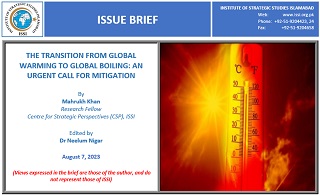“The era of global warming has ended” and “the era of global boiling has arrived.”
UN Secretary-General António Guterres
The transition from ‘global warming’ to ‘global boiling’ refers to the increasing severity and intensity of climate change impacts, particularly related to rising temperatures. The term “global boiling” has been used by the United Nations to emphasize the urgent and alarming nature of the situation.[1] This transition (from global warming to global boiling) represents a critical juncture for humanity. The impacts of global boiling include extreme heatwaves, changes in precipitation patterns, loss of biodiversity, and threats to human health.[2]
The phenomenon of global warming has been a pressing environmental concern for several decades. However, recent scientific evidence suggests that the Earth is rapidly approaching a tipping point, beyond which global warming will transition into a more severe state known as global boiling. According to the World Meteorological Organization (WMO) and the European Commission’s Copernicus Climate Change Service, July 2023 has seen the hottest three-week period ever recorded and the three hottest days on record.[3]















